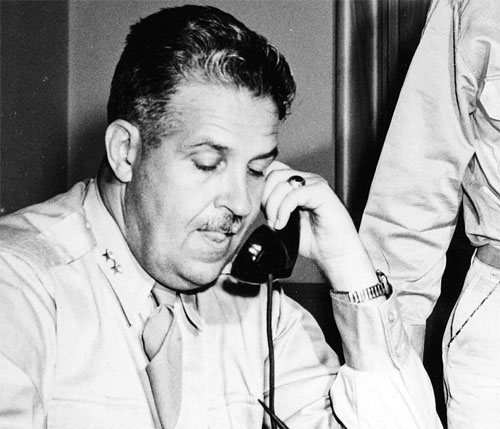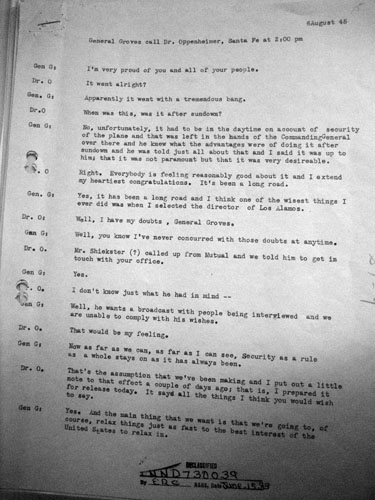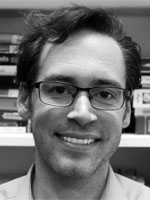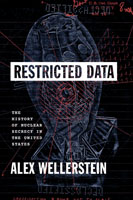Telephone calls are one of those fairly ephemeral forms of communication that don’t usually end up in the archival record. There are exceptions, though, especially in areas where security was a top concern. FBI files, for example, often contain telephone transcripts recorded without the knowledge of the participants — an awful thing for civil liberties, but a fairly useful thing for an historian!
General Groves had several transcripts of his telephone conversations taken and written out. Whyis a good question — one I don’t know the answer to. But the ones that are in the archives are mostly of rather momentous importance, and so I guess it would not be unreasonable to assume that Groves considered them to be part of the essential record of the Manhattan Project, which he was fastidious about preserving — in part because he feared being endlessly cross-examined by Congressional committees in the early postwar period. 1
This week’s document is a rather amazing telephone conversation between Groves and Oppenheimer on the afternoon of August 6, 1945 — not long after Groves himself learned about the bombing of Hiroshima. 2
Some curious excerpts of this curious conversation between “Gen. G” and “Dr. O” follow!
Gen. G: I’m very proud of you and all your people.
Dr. O: It went alright?
Gen. G: Apparently it went with a tremendous bang.
Dr. O: When was this, was it after sundown?
Gen. G: No, unfortunately, it had to be in the daytime on account of security of the plane and that was left in the hands of the Commanding General over there and he knew what the advantages were of doing it after sundown and he was told just all about that and I said it was up to him; that it was not paramount but that it was very desirable.
“It” here is, of course, the bombing of Hiroshima. A “tremendous bang” indeed. The Commanding General is, I believe, Curtis LeMay. It’s interesting that the first thing Oppenheimer is concerned about is whether it was dark or not — I suspect it is because they imagined that the atomic bomb would have extra theatrical effect if it wasn’t competing with the Sun for attention.
Dr. O: … Everybody is feeling reasonably good about it and I extend my heartiest congratulations. It’s been a long road.
Gen. G: Yes, it has been a long road and I think one of the wisest things I ever did was when I selected the director of Los Alamos.
Dr. O: Well, I have my doubts, General Groves.
Gen. G: Well, you know I’ve never concurred with those doubts at anytime.
Other than the Oppenheimer/Groves post-Hiroshima bromance, it’s interesting how Oppenheimer words the opinion at the lab: “Everybody is feeling reasonably good about it.” There’s a lot of deliberate ambiguity there — “reasonably good.”
Dr. O: Mr. Shiekster (?) called up from Mutual and we told him to get in touch with your office.
Gen. G: Yes.
Dr. O: I don’t know just what he had in mind.
Gen. G: Well, he wants a broadcast with people being interviewed and we are unable to comply with his wishes.
Dr. O: That would be my feeling.
Gen. G: Now as far as we can, as far as I can see, Security as a rule as a whole stays on as it has always been.
Dr. O: That’s the assumption that we’ve been making and I put out a little note to that effect a couple of days ago; that is, I prepared it for release today. It says all the things I think you would wish to say.
I don’t know what “Mutual” means here, (Update: Josh Pollack helpfully sent me this link, which clarifies what Mutual is — the Mutual Broadcasting System) or who “Shiekster (?)” is meant to be, but it’s an interesting little discussion about the lack of change in project security, despite the fact that the main “secret” of the Manhattan Project — its intended purpose — was now out in the world.
Dr. O: How did the discussion that Uncle Jim was involved in come out?
Gen. G: That awaits the decision of the President. The pros and cons are to be presented to him because there are certain things that he will more or less be affected by in both directions and we’re not making any decision that affects him.
Dr. O: Well, it doesn’t affect us either but I just was curious.
Gen. G: Now as soon as he gets back, that will be presented and I think its only a question of a decision waiting for a few days.
I suspect “Uncle Jim” is James B. Conant, President of Harvard, and “the discussion” that Truman is going to be hearing the “pros and cons” of is whether to release the Smyth Report. The decision to write the Smyth Report had been made in 1944, but the decision to release it was not finalized by Truman until the morning of August 9 (before they knew about the outcome of the Nagasaki bombing) after just such a “pros and cons” meeting.
Dr. O: Well, there may be some questions that —
Gen. G: Some questions you might want and the messages that I’ve gotten wind up with this statement: “Every effort is being devoted to the next objective.”
Dr. O: Good.
Gen. G: And as soon as they take their next objective it will be devoted to the one beyond that.
Dr. O: Good. We won’t be behind schedule on that.
“The next objective” is the use of the Fat Man bomb. (Initially on Kokura, with Nagasaki as the backup.) And “the one beyond that” is the “third shot” planned for the end of August. “…as soon as they take their next objective it will be devoted to the one beyond that…” As soon as they destroy the next city, the work will be devoted to the one to destroy after that. Grim stuff, that backs up Michael Gordin’s argument that they weren’t expecting immediate surrender and were planning to keep churning out atomic bombs as long as it took.
So, what did General Groves and Robert Oppenheimer talk about in their first post-Hiroshima telephone call? They congratulated each other (at length), they agreed not to lessen security, they conferred on the Smyth Report, and they elliptically committed themselves to dropping as many atomic bombs as was deemed necessary. Was it a time (for Oppenheimer, anyway), of great introspection and moralization? Perhaps — but that’s not what he talked about on the phone.
- On Groves’ fears of death-by-committee, see esp. Stanley Goldberg, “General Groves and the atomic West: The making and meaning of Hanford,” in Bruce Hevly and John Findlay, eds., The atomic West (Seattle, Wash.: University of Washington Press, 1998), 39-89.[↩]
- Citation: Transcript of a telephone conversation between Leslie R. Groves and J. Robert Oppenheimer (6 August 1945), Manhattan Engineer District (MED) records, Records of the Army Corps of Engineers, RG 77, National Archives and Records Administration, Box 86, “Groves, L.R. Lt. Gen. – Telephone conversations.”[↩]




How many pits existed at this time?
Just the Fat Man pit, which was by this point already on Tinian. The third pit would have been ready by the end of August 1945. (Had they converted the HEU in Little Boy from the gun-type design to implosion pits, they would have had quite a few more at this point, but that would have taken time that Groves didn’t want to spend. Oppenheimer suggested this to Groves after Trinity but was turned down.)
http://www.dannen.com/decision/opp-tel.html
—If you are taking advice…look for a book called “The Weapon of Scilence,” which was about the U.S. wartime secrecy office. “Shiekster” was, I suspect, an editor at the Mutual Broadcast System who would have gotten “O” telephone number from the wartime secrecy office. An interview with the Manhattan Project scientists in August of 1945 would have had to have been cleared by the official censorship office to be broadcast. I also suspect the “Shiekster” would have been responsible for MBS first interview with anyone connected to the Manhttan Project. Since radio interviews would have been listed in the newspapers, I suggest going through newspapers looking for Groves and Oppenhiemer qoutes, ones that might lead to the words “on an MBS broadcast, Dr. Robert J. Oppenhiemer said…”
I doubt they let anyone conduct an interview at this point. They were pretty mum about the whole thing until after the Japanese surrender, and even then, it was still pretty high security for people like Groves and Oppenheimer. The Manhattan Project secrecy wasn’t quite the same thing as the regular Office of Censorship secrecy, though it did use the Office at various junctures.
—If my memory is right, Groves tried to suppress the true story of Hiroshima, because radiation sickness deaths were something he wanted to keep secret. I think the secrecy that Groves would want to keep around the Manhattan Project (even though “it was now out in the world”) was probably because they simply didn’t know about the unforseen effects of The Bomb, and anything said on MBS would naturally give someone a question to ask he did not want to answer.
There is a lot of back and forth in the literature about Groves and the suppression of the radiation issue at Hiroshima, but it’s not what’s going on in this transcript, which is too early. Remember that on August 6, even Groves didn’t know what was going on in Hiroshima, other than the fact that the bomb had gone off there. The accounts of radiation in Hiroshima and Nagasaki did not come in until the end of August, and Groves was initially quite skeptical of them because he had been assured by the scientists (e.g. Oppenheimer) that at the height that the bomb was detonated, there would be little fallout, and that anyone likely to be in the range of prompt radiation effects would have been killed by other means first. He turned out to have been wrong on many of these points, though he did send over a team of scientists to investigate these reports.
Groves’ interest in this and other immediate postwar issues regarding secrecy and publicity are pretty interesting. There will be an entire chapter devoted to the question in my forthcoming book. There’s a lot to say about it…